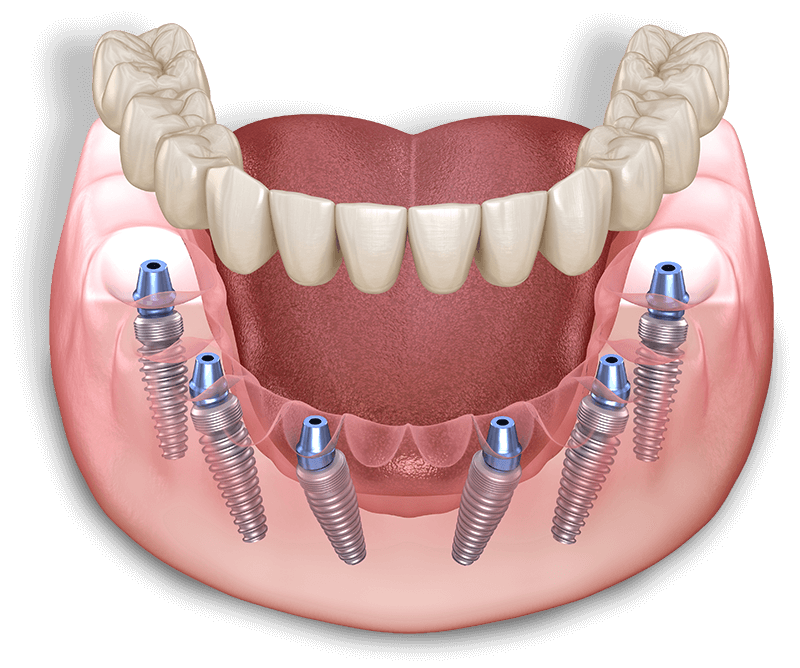If you’re asking “what are dental implants made of,” this guide will walk you through the parts of an implant, the materials used, and why those choices matter for strength, healing, and appearance. You’ll learn the three main components—the fixture (root), the abutment (connector), and the crown or prosthetic—and practical next steps for choosing the right option.
For patients searching “what are dental implants made of in Fort Lauderdale, FL,” knowing the materials helps you ask better questions at your consultation and pick a solution that fits your health, smile goals, and budget.
What Are Dental Implants Made Of? The three main parts
The implant fixture (root)
The fixture is the metal post surgically placed into the jawbone. Its job is to act like a tooth root and allow bone to fuse to it through osseointegration. Common materials for the fixture include medical-grade titanium and titanium alloys, and in some cases zirconia (a very strong ceramic). The fixture must be strong, corrosion-resistant, and highly biocompatible so bone can bond securely.
For those interested in the surgical placement of implants, understanding this foundational step is crucial for overall success.
The abutment (connector)
The abutment sits on top of the fixture and connects the root to the visible crown or prosthetic. Abutments are often titanium, but they can also be zirconia for better aesthetics when the gum line is thin. Titanium abutments are durable and proven; zirconia abutments offer a tooth-colored option that reduces gray shine through the gum.
The crown or prosthetic (tooth replacement)
The crown or prosthetic is what you see and use to chew. Materials include porcelain-fused-to-metal, full-ceramic (like zirconia), and acrylic or composite for temporary or full-arch provisional bridges. Porcelain and zirconia give the best natural look and are used for long-term single crowns and final bridges. Acrylic is lighter and cheaper, often used for same-day temporary restorations or provisional full-arch dentures.
Common materials used and why dentists choose them
Titanium and titanium alloys
Titanium is the industry standard for fixtures because it’s strong, lightweight, and has an excellent track record for bonding with bone. Titanium resists corrosion and has decades of long-term success data, which is why many clinicians prefer it for root posts and many abutments.
Zirconia (ceramic) implants and components
Zirconia is a metal-free ceramic that offers excellent aesthetics and good strength. Dentists may choose zirconia fixtures or zirconia abutments when patients want a fully ceramic option or have thin gums where metal could show. Zirconia is also chosen when patients request a metal-free restoration for personal or medical reasons.
Ceramics, porcelain, and acrylic for crowns
Full-ceramic crowns (like zirconia) and porcelain provide lifelike translucency and color match, making them ideal for front teeth and single-tooth restorations. Porcelain-fused-to-metal can be durable for back teeth. Acrylic or composite is used for temporary or provisional prosthetics and is easier and cheaper to adjust during healing or immediate-load treatments.
How material choice affects longevity and function
Material affects fracture risk, wear, and corrosion. Titanium fixtures rarely corrode and support long-term stability. Zirconia is very hard and resists staining, but in rare cases can be more brittle under extreme forces. Prosthetic materials also wear differently: acrylic wears faster than porcelain or zirconia and may need replacement sooner. Your dentist will match materials to your bite strength, bruxism risk, and whether you need a single crown or a full-arch restoration.
Safety, allergies, and biocompatibility
Most patients tolerate implant materials well. True metal allergies to titanium are very rare. If you have a history of metal sensitivity, clinicians can test or consider zirconia options. Biocompatibility matters because it affects healing, bone integration, and long-term health of the implant site.
How clinicians decide which material is best for you
Selection depends on several factors:
- Bone quality and volume
- Bite forces and bruxism (teeth grinding)
- Smile zone visibility and aesthetic demands
- Whether the implant is immediate-load (same-day) or delayed
- Medical history and allergies
- Patient budget and preference
Maintenance: caring for different implant materials
Daily hygiene is key for all implants: brush twice a day, floss or use interdental brushes, and rinse as recommended. Regular professional cleanings help prevent gum inflammation around implants. Specific notes:
- Zirconia and porcelain crowns resist staining but still need cleaning like natural teeth.
- Acrylic prosthetics may require more frequent polishing or replacement.
- Use non-abrasive toothpaste and follow your dentist’s tools for home care if you have a full-arch prosthetic.
Why experience and in-house tech matter when choosing implant materials
Advanced imaging, guided surgery, and an on-site lab help clinicians plan ideal implant placement and fabricate prosthetics that fit precisely. When a practice controls imaging and milling under one roof, they can match materials to your anatomy and finish restorations faster with higher accuracy. That reduces complications and improves aesthetic outcomes.
About In A Day Smile Dental Implant Centers and Dr. Burak Taskonak
In A Day Smile Dental Implant Centers in Fort Lauderdale, FL, specializes in immediate-load full-mouth solutions and offers both titanium and zirconia options. Led by prosthodontist Dr. Burak Taskonak, the practice pairs advanced CBCT imaging, guided surgery, and an in-house lab to design and mill custom restorations. Their technology and experience help patients get durable, natural-looking results, often in a single day, with a lifetime warranty on implant restorations.
Quick conclusion and next steps
Knowing “what are dental implants made of” helps you choose the right implant path. If you want answers tailored to your mouth and lifestyle, book a consult to discuss material options, implant timing, and a care plan. For those searching “what are dental implants made of in Fort Lauderdale, FL,” bring questions about titanium vs. zirconia, crown materials, and the practice’s imaging and lab capabilities to make the best decision for your smile.


